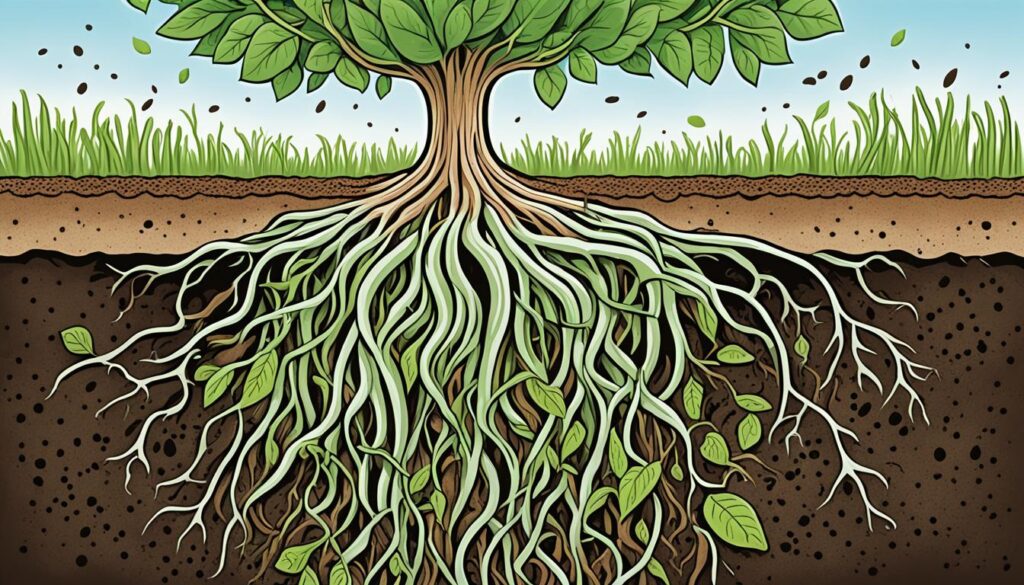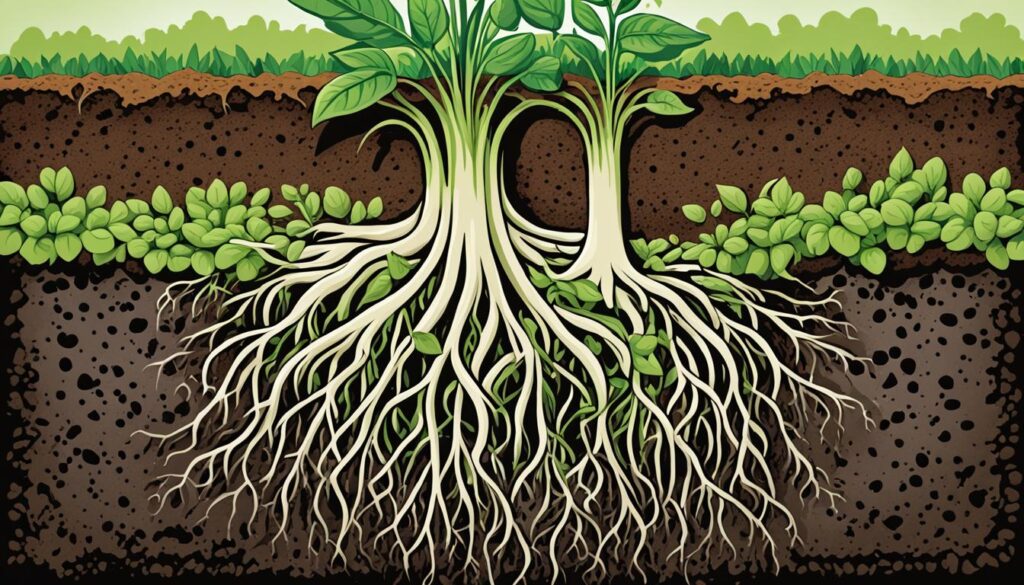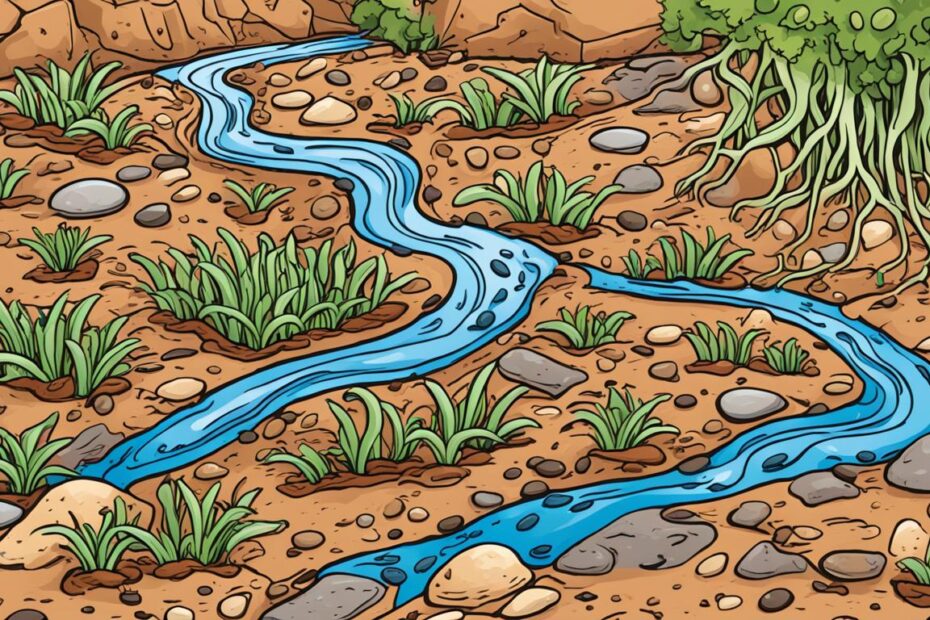Have you ever wondered why some plants thrive while others struggle to survive even with proper care? The secret lies beneath the surface: permeable soil. But what exactly is permeable soil, and why is it so crucial for the growth of high-drainage plants?
Permeable soil is the key to creating an ideal environment for plants that require proper drainage. It allows for the easy movement of air and water through the soil, providing crucial oxygen, moisture, and nutrients to the roots. By understanding the importance of permeable soil, you can unlock the secret to vibrant and healthy plant growth.
Key Takeaways:
- Permeable soil is essential for high-drainage plants that require proper water drainage and air circulation.
- It allows for the movement of air and water through the soil, providing vital oxygen, moisture, and nutrients to the roots.
- Improving soil permeability can be done by adding organic matter, such as aged manure or compost.
- Testing soil permeability can help assess the availability of essential elements for plant uptake.
- Understanding and prioritizing soil permeability is crucial for promoting robust plant growth.
Importance of Soil Permeability for Plant Uptake
Soil permeability plays a crucial role in ensuring the health and growth of plants by affecting the supply of root-zone air, moisture, and nutrients. It determines how easily water and air can move through the soil, providing the necessary elements for plant uptake. Efficient plant uptake relies on a well-permeable soil that facilitates the movement of these essential resources to the roots.
When soil permeability is slow, it restricts the availability of oxygen, moisture, and nutrients to the roots, leading to stunted plant growth. Insufficient airflow can suffocate the roots, while limited access to moisture and nutrients hinders their development. On the other hand, highly permeable soils promote better root development and nutrient uptake, resulting in vigorous plant growth and overall plant health.
The availability of root-zone air is particularly important as it allows for essential metabolic processes to occur within the plant, such as respiration. Adequate oxygen supply to the roots ensures the efficient utilization of energy and the promotion of healthy cellular functions.
“Soil permeability is the key to a thriving plant kingdom. It is the gateway through which plants acquire the vital elements they need to flourish.”
Moreover, soil permeability directly influences the availability of moisture and nutrients to the roots. Moisture is essential for plant hydration and the transportation of nutrients throughout the plant. Nutrients, including vital macronutrients like nitrogen, phosphorus, and potassium, as well as micronutrients like iron, zinc, and manganese, are necessary for proper plant growth and development.
Testing soil permeability is crucial for assessing the availability of these essential elements for plant uptake. By determining the permeability of the soil, gardeners can make informed decisions about suitable plant species and ensure proper soil management practices.
Overall, recognizing the importance of soil permeability for plant uptake is essential for fostering optimal plant growth and ensuring the success of your garden.
Factors Influencing Soil Permeability
| Factors | Description |
|---|---|
| Soil Composition | The presence of minerals, organic matter, living organisms, gas, and water affects soil permeability. |
| Soil Texture | The size and arrangement of soil particles, such as clay, silt, and sand, contribute to the permeability of the soil. |
| Soil Structure | The arrangement of soil particles into aggregates or clumps influences the soil’s permeability. |
| Soil Moisture | The content of moisture in the soil affects its permeability, as excessive water can lead to compaction and reduced permeability. |
| Soil Depth | The thickness of the soil layer affects its permeability, with deeper soils generally having higher permeability due to increased pore space. |

Factors Affecting Soil Permeability
Several factors influence soil permeability, including the hydraulic gradient, soil type, texture, and particle size distribution.
The hydraulic gradient refers to the difference in water level between two points, which drives the movement of water through the soil. This gradient is a crucial factor in determining the flow rate of water in the soil.
Soil type and texture play a significant role in determining the permeability rates. Finer soils like clay have slower permeability compared to coarser soils like sand. Clay particles are tightly packed, reducing the soil’s ability to allow water to flow through. In contrast, sand particles have larger spaces between them, enabling water to move more freely.
The particle size distribution affects soil permeability as well. A balanced mixture of different-sized particles, including sand, silt, and clay, allows for better drainage. This diversity in particle sizes creates pore spaces in the soil, facilitating the movement of water.
Other factors, such as cracks, holes, and soil structure, can also have an impact on soil permeability. Cracks and holes can create pathways for water to pass through, increasing permeability. Soil structure, influenced by organic matter and microbial activity, affects the arrangement of soil particles and influences permeability.
In summary, soil permeability is influenced by several factors, including the hydraulic gradient, soil type, texture, particle size distribution, cracks, holes, and soil structure. Understanding these factors is essential for assessing soil permeability and making informed decisions about soil management.
Significance of Permeable Soil for Plant Health
Permeable soil plays a vital role in maintaining the health and vibrancy of your plants. Its ability to allow for proper water drainage is essential in preventing waterlogged conditions that can lead to root rot and various plant diseases. By facilitating effective air circulation, permeable soil ensures that oxygen is readily available to the roots, supporting crucial metabolic processes like respiration. Moreover, permeable soil plays a key role in promoting nutrient availability by preventing nutrient leaching and maintaining a well-balanced nutrient environment around the roots.
When your plants have access to permeable soil, they have the best chance to thrive and reach their full potential. The proper functioning of permeable soil is vital for plant health because it provides the following benefits:
- Prevents waterlogged conditions and root rot
- Facilitates effective air circulation and oxygen supply to the roots
- Maintains a balanced nutrient environment, preventing nutrient loss through leaching
A well-drained soil with adequate air circulation and nutrient availability creates an optimal environment for plant growth and development. With permeable soil, your plants can establish healthy root systems, absorb essential nutrients efficiently, and maintain robust overall plant health.
“Permeable soil is the foundation of plant health, providing the necessary conditions for optimal growth and vitality.”
Here is an image showcasing the importance of permeable soil for plant health:

How to Improve Soil Permeability
Improving soil permeability is essential for creating an optimal environment for plant growth. By enhancing the ability of soil to absorb and drain water effectively, you can provide a healthy habitat for your plants to thrive. There are several methods to improve soil permeability, whether you’re dealing with clay soil or sandy soil. Let’s explore some effective strategies:
1. Adding Aged Manure or Compost
One of the most effective ways to improve soil permeability is by adding organic matter such as aged manure or compost. These amendments enrich the soil with valuable nutrients and increase the variety of particle sizes, creating a more porous structure. The increased pore spaces allow for better drainage and root penetration. When dealing with clay soils, which tend to have slower permeability, adding aged manure or compost helps break up the compacted particles and improves drainage. In sandy soils, which drain too quickly and can lead to nutrient leaching, organic matter helps retain moisture and nutrients, improving their holding capacity.
2. Practicing Regular Soil Care
In addition to adding organic matter, implementing regular soil care practices can also contribute to improving soil permeability. For example, avoiding overwatering is crucial, as excessive water can lead to soil compaction and hinder drainage. Instead, water your plants deeply but less frequently, allowing the soil to dry out slightly between watering sessions. Aerating compacted soil through methods like core aeration can also help improve permeability by creating pathways for air and water to move through the soil.
3. Incorporating Soil Amendments
Depending on your specific soil needs, incorporating certain soil amendments can aid in improving soil permeability. For example, if you’re dealing with heavy clay soil, adding gypsum can help improve structure and drainage. Additionally, agricultural lime can help correct acidity in the soil, which can improve permeability. Conduct a soil test to determine the specific needs of your soil and consult with a gardening expert for guidance on the appropriate amendments.
Remember, improving soil permeability is a continuous process that requires ongoing care and attention. Regularly monitoring the health of your soil and making necessary adjustments will ensure a favorable growing environment for your plants.
| Soil Type | Recommended Amendments |
|---|---|
| Clay Soil | Aged manure, compost, gypsum |
| Sandy Soil | Aged manure, compost, agricultural lime |
Permeability Testing Methods
Permeability testing plays a vital role in evaluating soil permeability levels, providing valuable insights into soil characteristics that directly impact plant growth and health. Two widely used methods for permeability testing are borehole permeability testing and field pumping tests. To accurately interpret the results, it is crucial to understand the soil’s texture, structure, and composition.
Borehole Permeability Testing
Borehole permeability testing involves inserting a perforated pipe into the ground, typically at varying depths, to assess the rate at which water level drops. By measuring the time it takes for the water level to decrease a specific distance, this method provides valuable information about the permeability characteristics of the soil at that precise location. Borehole permeability testing is particularly useful for determining the permeability of different soil layers.
Field Pumping Tests
Field pumping tests involve the controlled pumping of water from a well while simultaneously measuring the pumping rate and the drawdown in the well. These measurements help calculate the hydraulic characteristics of the soil, providing essential information about its permeability. Field pumping tests are highly advantageous for evaluating the overall permeability of a specific soil area and can be conducted at different well locations to gather comprehensive data.
Both borehole permeability testing and field pumping tests require a thorough understanding of the soil characteristics, including texture, structure, and composition. By carefully analyzing the results obtained from these tests, professionals can make informed decisions regarding soil management and plant cultivation strategies.
| Permeability Testing Methods | Advantages | Limitations |
|---|---|---|
| Borehole Permeability Testing | – Provides detailed information about permeability characteristics at specific locations – Useful for evaluating the permeability of different soil layers | – Requires specialized equipment and expertise – Limited to specific test locations |
| Field Pumping Tests | – Evaluates the overall permeability of a specific soil area – Provides comprehensive data through multiple well locations | – Requires careful monitoring and control of pumping rates – May require significant time and resources |
Conclusion
Permeable soil is the foundation for successful gardening with high-drainage plants. By creating an environment that facilitates proper water drainage and air circulation, you can promote robust plant growth and ensure the health of your soil. The movement of water and air through permeable soil delivers essential elements for plant growth, including nutrients, root-zone air, and moisture.
To enhance soil permeability, it is important to focus on improving the structure of your soil. Incorporating organic matter, such as compost or aged manure, can break up compacted soil and create a porous environment that allows for better drainage and root penetration. In addition, implementing proper soil care practices, like avoiding overwatering and aerating compacted soil, can further enhance permeability.
To ensure the suitability of your soil for high-drainage plants, it is beneficial to test its permeability. Permeability testing methods, such as borehole permeability testing and field pumping tests, can provide valuable insights into the characteristics of your soil. Understanding and prioritizing soil permeability is key to creating an ideal environment for plant growth and ensuring the success of your garden.
In conclusion, by cultivating permeable soil and paying attention to its health, you can foster optimal conditions for high-drainage plants. With proper water drainage, air circulation, and nutrient availability, your plants will thrive and flourish. Embrace the importance of permeability in your gardening journey and unlock the full potential of your plants and soil.
FAQ
Why is permeable soil best for plants that need a lot of drainage?
Permeable soil allows for the easy movement of air and water through the soil, providing vital oxygen, moisture, and nutrients to the roots of plants that require high drainage. It prevents waterlogged conditions and promotes effective air circulation, ensuring plant health and vigor.
How can I improve soil permeability?
You can improve soil permeability by adding organic matter such as aged manure or compost. These amendments increase the variety of particle sizes in the soil, creating a more porous structure that allows for better drainage and root penetration. Regular soil care practices, such as avoiding overwatering and aerating compacted soil, can also contribute to improving soil permeability.
What factors affect soil permeability?
Several factors influence soil permeability, including the hydraulic gradient, soil type, texture, particle size distribution, cracks, holes, and soil structure. The hydraulic gradient refers to the difference in water level between two points, which drives the movement of water through the soil. Soil type and texture play a significant role in determining permeability rates, with finer soils like clay having slower permeability compared to coarser soils like sand. Particle size distribution also affects soil permeability, with a balanced mixture of different-sized particles allowing for better drainage.
Why is soil permeability important for plant uptake?
Soil permeability is crucial for plant uptake as it affects the supply of root-zone air, moisture, and nutrients. It determines how easily water and air can move through the soil, providing the necessary elements for plant growth. Slow permeability can restrict the availability of oxygen, moisture, and nutrients, leading to stunted plant growth. On the other hand, highly permeable soils allow for better root development and nutrient uptake, promoting vigorous plant growth.
How can I test soil permeability?
There are several methods to test soil permeability, including borehole permeability testing and field pumping tests. Borehole permeability testing involves inserting a perforated pipe into the ground and measuring the time it takes for the water level to drop a certain distance. Field pumping tests involve pumping water from a well and measuring the pumping rate and the drawdown in the well. Both methods rely on understanding the soil characteristics, such as texture, structure, and composition, to interpret the results accurately.
